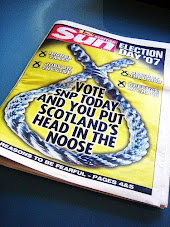Whilst scouring the internets this am looking for
something both sensible to read and waste time as the rest of the house arose
from their slumbers I happened upon the letter below in the Belfast Newsletter.
Hugely impressed with the rational observations and
radical ideas therein, I decided to tweet the link. Happy in the knowledge that
a few like minded souls were similarly impressed and chose to send it furth to
their contacts, I now think the contents of this letter deserves a wider
audience. Have a read at it, if you agree with the sentiments expressed, then
spread it far and wide.
Mr Bernard J Mulholland, Sir, my bunnet is tipped
in your general direction, for the best letter on the Independence debate I've
read in ages and for resurrecting the splendid 'Picaroons'. Thank you.
Independence won’t lead to UK break-up
Published on Friday 1 June 2012 09:48
I FOUND Saturday’s editorial (News Letter, May 26) to be misleading.
The editorial argues that if the
campaign for Scottish independence is successful this will lead to the
‘irrevocable break-up of the United Kingdom’.
It will do no such thing.
The
SNP have said they will retain the monarch as head of state, but the
Scots wish to take their own decisions in Edinburgh free from
interference by Westminster.
In simple terms – the ‘union’ remains intact but the picaroons at Westminster and in Whitehall will be shown the door.
Similarly,
the editorial asks whether Scotland will have its own currency, and yet
the SNP have made it abundantly clear that they will indeed retain
their ‘own currency,’ i.e. sterling.
As yet there has been little
in the way of discussion as to how this arrangement will work in
practice, but it is likely that this will formally create a ‘sterling
zone’ operating parallel with the eurozone, and so the European Union
will have two international currency unions operating within its
borders.
This opens up an interesting possibility with regard to some of those economies currently struggling within the eurozone.
If
the UK government chose to it could bring forward Scottish
independence, apply the same status to Wales and Northern Ireland, and
in so doing formalise the creation of a federated sterling zone within
the EU, which could operate in parallel with - and complement - the
euro.
In doing so it could introduce an ‘Anglo-Saxon’ fiscal and monetary union as practised by our cousins in the USA.
One
attraction in doing this is that, rather than being forced to go it
alone, Greece (and indeed any other member of the EU) could be invited
to join this Sterling zone, but at a rate that better suits its
prevailing economic situation.
The 11 million-strong population of
Greece is barely twice that of Scotland and, if handled
sympathetically, their adoption of sterling – which is already an
international currency – could be relatively smooth.
The US dollar is the national currency of at least one country outside of the USA, and so this scenario is not untested.
Furthermore,
the institutions of a federated sterling zone could be dispersed among
its members as a means of creating high value jobs and distributing
wealth.
One last observation is that ‘the SNP was seen by many
working-class Catholics as a Protestant party, even as an Orange
organisation’ (‘Scotland’s Irish question’, New Statesman, March 5,
2012, page 34).
The News Letter’s readers might benefit from a
few in-depth interviews with the SNP and the Scottish independence
campaign rather than peddling Westminster’s ill-informed tittle-tattle.
Bernard J Mulholland
Belfast












